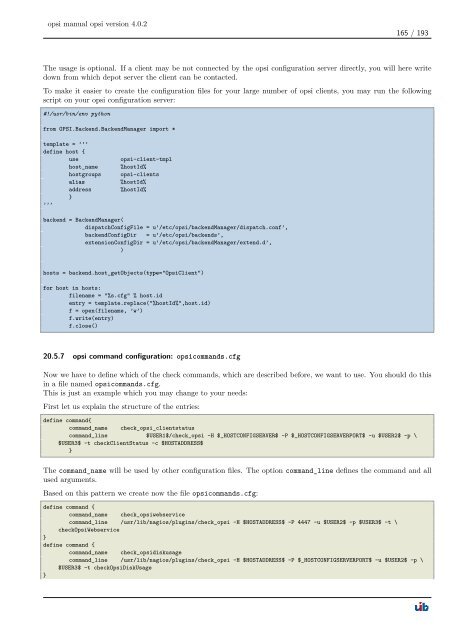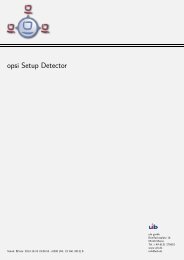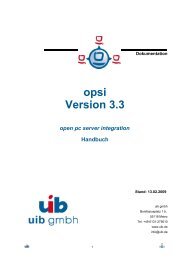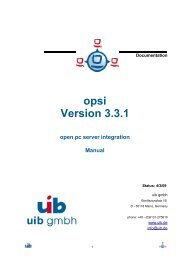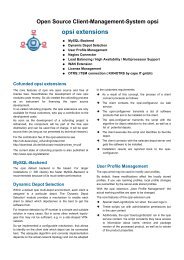opsi manual opsi version 4.0.2 - opsi Download - uib
opsi manual opsi version 4.0.2 - opsi Download - uib
opsi manual opsi version 4.0.2 - opsi Download - uib
Create successful ePaper yourself
Turn your PDF publications into a flip-book with our unique Google optimized e-Paper software.
<strong>opsi</strong> <strong>manual</strong> <strong>opsi</strong> <strong>version</strong> <strong>4.0.2</strong><br />
165 / 193<br />
The usage is optional. If a client may be not connected by the <strong>opsi</strong> configuration server directly, you will here write<br />
down from which depot server the client can be contacted.<br />
To make it easier to create the configuration files for your large number of <strong>opsi</strong> clients, you may run the following<br />
script on your <strong>opsi</strong> configuration server:<br />
#!/usr/bin/env python<br />
from OPSI.Backend.BackendManager import *<br />
template = ’’’<br />
define host {<br />
use <strong>opsi</strong>-client-tmpl<br />
host_name %hostId%<br />
hostgroups <strong>opsi</strong>-clients<br />
alias %hostId%<br />
address %hostId%<br />
}<br />
’’’<br />
backend = BackendManager(<br />
dispatchConfigFile = u’/etc/<strong>opsi</strong>/backendManager/dispatch.conf’,<br />
backendConfigDir = u’/etc/<strong>opsi</strong>/backends’,<br />
extensionConfigDir = u’/etc/<strong>opsi</strong>/backendManager/extend.d’,<br />
)<br />
hosts = backend.host_getObjects(type="OpsiClient")<br />
for host in hosts:<br />
filename = "%s.cfg" % host.id<br />
entry = template.replace("%hostId%",host.id)<br />
f = open(filename, ’w’)<br />
f.write(entry)<br />
f.close()<br />
20.5.7 <strong>opsi</strong> command configuration: <strong>opsi</strong>commands.cfg<br />
Now we have to define which of the check commands, which are described before, we want to use. You should do this<br />
in a file named <strong>opsi</strong>commands.cfg.<br />
This is just an example which you may change to your needs:<br />
First let us explain the structure of the entries:<br />
define command{<br />
command_name check_<strong>opsi</strong>_clientstatus<br />
command_line $USER1$/check_<strong>opsi</strong> -H $_HOSTCONFIGSERVER$ -P $_HOSTCONFIGSERVERPORT$ -u $USER2$ -p \<br />
$USER3$ -t checkClientStatus -c $HOSTADDRESS$<br />
}<br />
The command_name will be used by other configuration files. The option command_line defines the command and all<br />
used arguments.<br />
Based on this pattern we create now the file <strong>opsi</strong>commands.cfg:<br />
define command {<br />
command_name check_<strong>opsi</strong>webservice<br />
command_line /usr/lib/nagios/plugins/check_<strong>opsi</strong> -H $HOSTADDRESS$ -P 4447 -u $USER2$ -p $USER3$ -t \<br />
checkOpsiWebservice<br />
}<br />
define command {<br />
command_name check_<strong>opsi</strong>diskusage<br />
command_line /usr/lib/nagios/plugins/check_<strong>opsi</strong> -H $HOSTADDRESS$ -P $_HOSTCONFIGSERVERPORT$ -u $USER2$ -p \<br />
$USER3$ -t checkOpsiDiskUsage<br />
}


